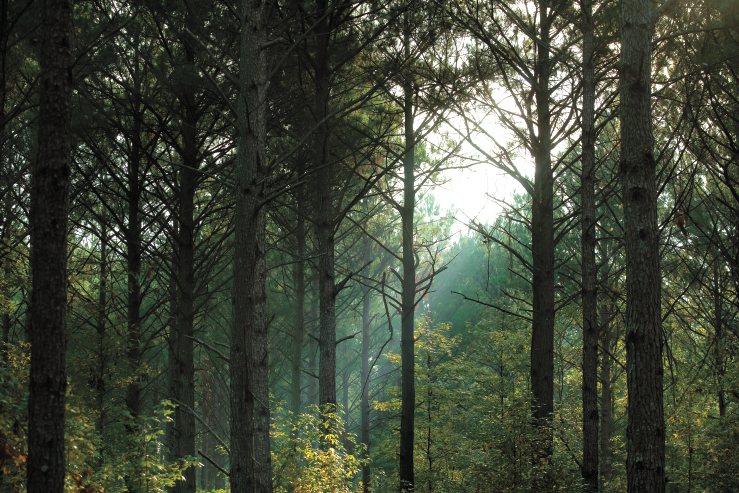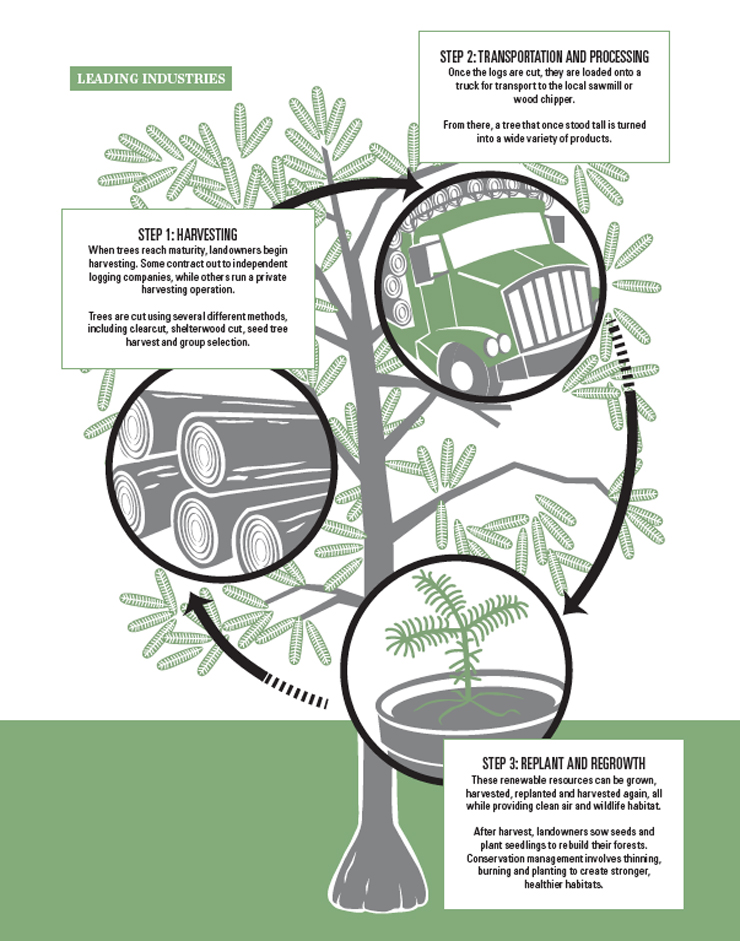Home > Mississippi > Mississippi Crops & Livestock > Mississippi Forest Landowners Harvest and Regrow Timber
Mississippi Forest Landowners Harvest and Regrow Timber
In partnership with: Mississippi Department of Agriculture and Commerce
 Russell Bozeman takes a step back and admires a stately cypress tree, standing tall and sturdy in the swampy Mississippi land. The tree is more than three decades old and soon the time will come to reap its rewards. Stories like this are common for Mississippi loggers and landowners.
Russell Bozeman takes a step back and admires a stately cypress tree, standing tall and sturdy in the swampy Mississippi land. The tree is more than three decades old and soon the time will come to reap its rewards. Stories like this are common for Mississippi loggers and landowners.
“Forestry is really big in Mississippi,” says Bozeman, director of forest protection and forestry information for the Mississippi Forestry Commission. “Almost 20 million acres across the state of Mississippi are covered in trees. That’s a very large land area and a very large economic impact.” The commission estimates that the timber industry earns between $1.3 and $1.5 billion from forestry and forest products every year. This is especially impactful due to the nature of tree growth in the state.
“You can just walk away from a tract of land and trees are going to grow. It’s just the way it is,” says Bozeman. “We grow trees here in Mississippi. That being said, forestry and forest management have become an essential part of this.”
Roughly 70 to 80 percent of the harvested forests in Mississippi are owned by nonindustrial private forest landowners – everyday people who own forest land. These landowners harvest, on average, 50 acres of trees every year. So, not only do these private forest landowners own the majority of the harvested forest land, they also make up most of those involved in the forestry and timber industry in the state.
“The way forestry works is, if there are trees on the property, there are industries inside Mississippi and outside who will use that resource,” Bozeman states. “This can be anything from fiber production to make everyday household products, like toilet paper and writing materials, to structural uses such as lumber and furniture.”
While many are familiar with using timber to make paper products and for construction, the Mississippi forestry industry is creating modern uses for timber and wood products.
“We have some innovative technology uses when it comes to biofuels that can be produced for larger markets in Mississippi and throughout the southeastern United States,” says Bozeman. “Everything from wood pellets that can keep furnaces running – and some people are even working to develop biofuels you can use in vehicles like an oil-based product. But the ultimate uses for timber and wood products depend on the market and depend on the trees.” 
Timber As A Trade
Once a landowner decides to log his property, he may either harvest the trees himself or contract out to a logging company. When the bidder is selected, the logging process begins. A carefully choreographed dance is the only way to ensure a safe and effective process. Foresters who work in the area go through the land and mark the border of trees with a florescent strip of paint to clearly select the tree or trees for harvesting. Lumberjacks in flannel shirts and overalls may come to mind, but just as the timber industry has changed, so has logging. Axes are no longer the main tool of the trade.
Rodney Zimmerman, a contract logger, arrives at a logging site in khakis with a pencil and clipboard in hand, making sure to steer clear of the massive machines around him. One employee runs a Bell Harvester, a huge, hydraulic cutter that is safer than chainsaws. A giant claw clamps onto the base of a tree, and the harvester cuts the trunk. The tree is lifted overhead onto a platform and cut to the desired length. A blur of saws and flying bark surround these loggers day in and day out. One wrong step could result in more than a lost tree.
“Logging is the most dangerous job in the world,” says Zimmerman. “People are maimed, crushed or disfigured every year.”
Once the logs are cut, they are loaded onto a truck for transport to the local sawmill or wood chipper. From there, a tree that once stood tall is turned into anything from a whiskey barrel to wooden chips for mulch. This diversity provides a major economic impact in terms of jobs for Mississippians. The forestry industry alone employs 125,000 people in the state, according to the Forest and Wildlife Research Center at Mississippi State University. Almost 41,000 of those are employed in timber production. 
Growing An Industry and Economy
Forestry and timber have an unparalleled impact in Mississippi and show tremendous potential for growth in the future. And after that cypress tree Bozeman worked so feverously to protect is cut down, another will be planted in its place. And in another 30 or so years, it too will be ready for harvest.



